Many of the largest tour companies in the United States are optimistic about the outlook for tourism and business growth in 2017, according to an economic impact study released by the United States Tour Operators Association (USTOA) at its annual conference and marketplace last month in Scottsdale, Arizona.
The study found that 82 percent of USTOA’s active members anticipate a growth in sales in 2017, with nearly half of those anticipating an increase of 7 percent to 10 percent or more. Slightly more than a third indicated that they expected sales increases of 4 percent to 6 percent in 2017.
The study also found that active USTOA members would sell about 4 percent more travel in 2016 than they did in 2015. Researchers projected that the association served 8.5 million travelers in 2016 and created $14.3 billion in economic impact.
The survey is conducted biennially on behalf of USTOA by PriceWaterhouseCoopers.
This optimism and growth outlook come despite an environment at home and abroad that several association leaders described as “challenging.”
“Election, Brexit — we have had a lot of things to deal with this year,” said Paula Twidale, chairwoman of USTOA and executive vice president at Collette. “But ultimately we are seeing stability and an increase in forward advanced bookings.”
Though overall business trends look positive, several members of the USTOA executive committee told reporters that terror attacks in Paris and Brussels put a damper on traditionally popular vacation packages to Europe in 2016. Some had anticipated record high travel to Europe, but the November 2015 terrorist attack in Paris led many travelers to cancel or reschedule their trips to the region in 2016.
“For Europe, we’re a little under where we were last year, but we’re happy with that because it could have been worse,” Twidale said.
The association also released its list of “hot” destinations for 2017. Cuba topped the list for the first time, and during an association survey earlier in 2016, nearly one-third of member tour operators said they anticipated that the easing of U.S. sanctions on Cuba would help increase their annual revenue.
With the election of Donald Trump, who has expressed opposition to the Obama administration’s opening of relations with Cuba, tourism leaders are now re-evaluating their outlooks on Cuban travel and adjusting their government relations efforts accordingly.
“Yes, we’re concerned, and we’re reaching out to potential allies,” said USTOA president and CEO Terry Dale. “But we want to wait and see. We are working the channels, but we don’t want to overreact.”
Executive committee members also discussed the potential impact that recent populist movements at home and abroad could have on travel.
“For the sophisticated traveler, it doesn’t pose much of a threat,” said Harry Dalgaard, USTOA treasurer and president and founder of Avanti Destinations. “They might have to go cap in hand when they travel and explain what is going on in the United States when they travel.”
Twidale said these recent developments reinforce the role that tourism leaders play in educating the traveling public.
“Part of our job is educating people about what impact tourism brings to the world,” she said. “Inbound and outbound travel both affect trade. There is an economic tie-in to our industry. It fuels jobs. If you want to see growth, you have to be prepared for that.”











